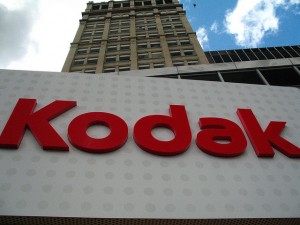Kodak may fade from public view

Among the iconic American businesses that have been driven into the tar pits of economic extinction, none will likely have a greater cultural impact than Eastman Kodak. From Hollywood’s “Gone with the Wind” to Paul Simon’s “Kodachrome,” film has been deeply entwined in the landscape of our lives – and those of people around the world.
“Kodak played a role in pretty much everyone’s life in the 20th century because it was the company we entrusted our most treasured possession to—our memories,” Robert Burley, a photography professor at Ryerson University in Toronto, told the Associated Press.
But times have changed, and Kodak has failed to keep up. Despite their near complete dominance of the film industry through the 80s and their prodigious technological capabilities, they have been beaten by tiny microchips and memory cards that have democratized filmmaking and shifted the intellectual center of the business west to Silicon Valley and on to Japan, China and Korea. Kodak has reported just one profitable year since 2004.
Hence, the company finds itself on the verge of complete insolvency. It was forced to file for Chapter 11 bankruptcy on January 19 and may not have the reserves to emerge from that status. Its only real source of substantive revenues now will come from the sale of its treasured patents – including those that created the digital imaging techniques that ended up killing the company.
However, Kodak enters bankruptcy with a plan to reorganize and move forward, as reported by the Associated Press:
“The Rochester, N.Y.-based company hopes to peddle a trove of photo patents and morph into a new-look powerhouse built around printers and ink. Even if it succeeds, it seems unlikely to ever resemble what its red-on-yellow K logo long stood for -- a brand synonymous in every corner of the planet with capturing, collecting and sharing images.”
One of the casualties of the filing may be the long-term relationship between the Academy of Motion Pictures Arts and Sciences and the Kodak Theater, which has hosted the Oscars for the past 10 years. The contract for the awards show is due to be re-negotiated after the 2013 telecast, and the Academy is considering whether it should disassociate itself from the tarnished brand.
"I don't think it's good branding at all for the Oscars to be associated with a bankrupt company," branding expert Adam Hanft told Reuters.
Hollywood has other reasons to distance itself from Kodak. Debts to the film studio represent a significant part of the company’s problems.
“Major entertainment companies listed among Kodak's top 50 unsecured creditors include Sony, owed $16.7 million; Warner Brothers, due $14.2 million; NBC Universal, short $9.3 million; Paramount Studios, owed $6.8 million; and Walt Disney Studios, $4.2 million,” Reuters reported.
Although most photographers have moved into digital imaging, Kodak’s bankruptcy filing is a bittersweet moment:
“There’s a kind of emotional connection to Kodak for many people,” said Burley. “You could find that name inside every American household and, in the last five years, it’s disappeared. At the very least, digital technology will transform Kodak from a very big company to a smaller one. I think we all hope it won’t mean the end of Kodak because it still has a lot to offer.”




